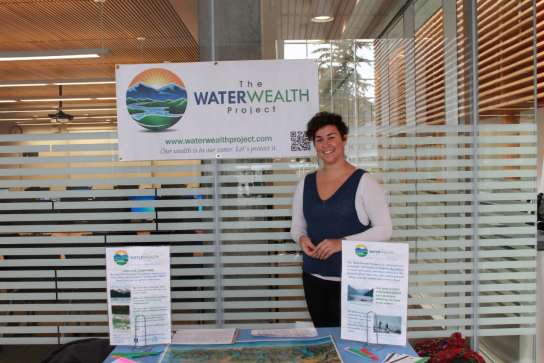By Katherine Gibson (Contributor) – Email
Print Edition: March 27, 2013
We drink it, cook with it and wash with it on a daily basis – but how often do we actually think about the water we use?
This month, BC celebrated “Water Week,” an event that encourages Canadians to actively participate in the ongoing conversation surrounding the use and protection of natural water.
One group that took this water initiative to heart is The Water Wealth Project (WWP).
WWP is a non-profit group that is based locally in Chilliwack and advocates giving citizens more control over the water that resides within their home community.
“People who call a place home should have the right to say yes or no to decisions that impact that home – especially in regards to water,” WWP rep Natalie Jones explains. She manned a booth at UFV’s Canada Education Park campus last week, explaining the organization to anyone who stopped by.
In order to help engage the community, WWP has set up pilot initiatives, including the use of digital mapping software.
“People can literally plot their story on a map,” says Jones. “They can place a pin and explain why that place is special to them or what they are concerned about.”
The use of this software has been received positively by the public and gives WWP a chance to more broadly understand the threats that face local water sources.
“It’s like gathering threads from the community,” Jones explains. “Each person’s own personal story is a thread, and once we’ve gathered many of those [threads] we will be able to weave them together into a community narrative.”
By building these narratives and giving the community a centralized voice, WWP hopes to empower citizens.
“People really care,” Jones says, “but when people feel disconnected from each other – they can feel helpless.”
“Our job is to connect those people,” she continues, “and aid them in feeling empowered enough to be a part of the solution.”
WWP’s desire for local water control comes on the heels of a recent and controversial decision by the Fraser Health Department to chlorinate Chilliwack’s water system.
“People felt frustrated,” Jones says. “Having a doctrine handed down to them by a system that they had no choice in – they were totally powerless.”
“People want to have a voice.”
WWP will continue to collect stories and engage with the community, educating and equipping individuals with the skills they need to actively participate in the decision making process of how local water sources are used.
“We are way stronger than we think,” Jones concludes, “especially when we get together.”
A few weeks back Jones attended a UFV anthropology class as a guest lecturer, where she explained the purpose of WWP.
She explained to the class that if the public were in control of the situation—rather than politicians already bogged down with other issues—they’d be more likely to look for the root cause of recent pollution to Chilliwack’s water.
Eliminating the pollution—and its root causes—would benefit the public the most, she explained; adding chemicals to the water is just a band-aid solution.
Those looking for more information about the project, or with interest in getting involved, can find out more at waterwealthproject.com or at the group’s Facebook page.



